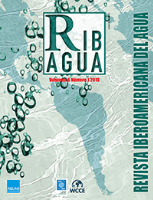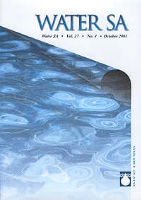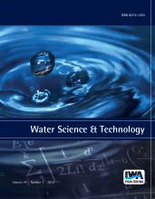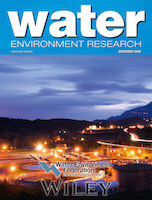
Journal of Water Chemistry and Technology
Scope & Guideline
Elevating Knowledge in Water Chemistry and Environmental Solutions
Introduction
Aims and Scopes
- Water Treatment Technologies:
The journal emphasizes research on various water treatment methods, including adsorption, photocatalysis, electrochemical processes, and advanced oxidation processes. These studies aim to improve the efficiency and effectiveness of removing contaminants from water. - Environmental Impact Assessment:
Publications often include assessments of the environmental impacts of water pollutants, focusing on the toxicity of various substances and their effects on aquatic ecosystems. This area highlights the need for sustainable practices in water management. - Innovative Materials for Water Purification:
The journal showcases the development and application of new materials, such as nanomaterials and biosorbents, for enhanced water purification processes. This includes studies on the synthesis, characterization, and optimization of adsorbents and catalysts. - Hydrochemistry and Water Quality Monitoring:
Research on the hydrochemical characteristics of various water sources and the monitoring of water quality parameters is a core focus. This includes studies that analyze the suitability of water for different uses, such as irrigation and drinking. - Wastewater Management Strategies:
The journal covers innovative strategies for wastewater treatment and management, including biological, physical, and chemical methods. This encompasses case studies and modeling approaches to optimize treatment processes.
Trending and Emerging
- Nanotechnology in Water Treatment:
Recent publications increasingly explore the application of nanotechnology, particularly in the development of novel nanomaterials for water purification. This trend highlights the potential of nanoscale materials to enhance adsorption and degradation processes. - Bioremediation and Use of Natural Materials:
There is a growing focus on bioremediation techniques, utilizing natural materials and biological agents to treat contaminated water. This trend reflects a broader shift towards sustainable and environmentally friendly practices in water management. - Integrated Water Management Approaches:
Research is trending towards integrated approaches that combine multiple treatment technologies and strategies for wastewater management. This includes studies on hybrid systems that optimize the treatment process efficiency. - Impact of Climate Change on Water Resources:
Emerging research themes include the effects of climate change on water quality and availability. This trend is critical as it addresses the urgent need to understand and mitigate the impacts of changing environmental conditions on water resources. - Advanced Analytical Techniques for Water Quality Assessment:
There is an increasing interest in employing advanced analytical techniques, such as spectroscopy and chromatography, for detailed water quality assessment. This trend underscores the importance of precise measurement and understanding of contaminants in water.
Declining or Waning
- Conventional Chemical Treatment Methods:
There has been a noticeable decline in publications focusing solely on traditional chemical treatment methods, such as coagulation and flocculation. Researchers are increasingly exploring more advanced and integrated approaches, which may explain this trend. - Low-Tech Water Purification Techniques:
Research on low-tech or rudimentary water purification methods has diminished, possibly due to a growing preference for more innovative, efficient, and sustainable technologies that can be applied at a larger scale. - Static Water Quality Assessment Studies:
There is a waning interest in static assessments of water quality without accompanying technological solutions or treatment methodologies. Researchers are now more inclined to couple water quality monitoring with treatment innovations.
Similar Journals

RIBAGUA-Revista Iberoamericana del Agua
Exploring innovative solutions for sustainable water management.RIBAGUA-Revista Iberoamericana del Agua is an esteemed academic journal dedicated to the study and dissemination of water-related research within the Ibero-American context. Published by TAYLOR & FRANCIS LTD, this Open Access journal has been providing a platform for scholarly articles since 2015, promoting visibility and accessibility for researchers, professionals, and students engaged in environmental science, hydrology, and water resource management. With the objective of enhancing the understanding of water issues affecting the Ibero-American region, RIBAGUA invites contributions that address innovative practices, policy implications, and scientific advancements. By fostering inter-regional dialogue and collaboration, it stands as a vital resource for those looking to contribute to sustainable water management solutions. The journal is committed to maintaining high standards of academic integrity and is ideal for anyone seeking to advance their knowledge and research in the water sciences.

WATER SA
Advancing water science for a sustainable future.WATER SA, published by the WATER RESEARCH COMMISSION, serves as a pivotal platform for interdisciplinary research in the areas of water science and technology. With an ISSN of 0378-4738 and an E-ISSN of 1816-7950, this open-access journal has been committed to disseminating knowledge since 2005, ensuring that research is freely accessible to a global audience. As of 2023, it holds a Q3 ranking in several key categories including Applied Microbiology and Biotechnology, Management, Monitoring, Policy and Law, Waste Management and Disposal, and Water Science and Technology. These rankings reflect its significant contribution to these disciplines, particularly in South Africa where it is based. With a history dating back to 1976 and converging research efforts extending through 2024, WATER SA aims to illuminate pressing water-related challenges and foster innovative solutions through rigorous scientific inquiry. Researchers, professionals, and students interested in the sustainability and management of water resources will find its comprehensive portfolio essential for advancing their work and understanding in an increasingly critical field.

WATER SCIENCE AND TECHNOLOGY
Innovating water management for a better tomorrow.WATER SCIENCE AND TECHNOLOGY, published by IWA PUBLISHING, is a leading academic journal dedicated to advancing the field of water science and technology. With a rich history dating back to 1970, the journal provides a platform for innovative research and technological advancements, catering to the vital challenges faced within the realms of environmental engineering and water resource management. As evidenced by its strong ranking in Scopus, where it holds a position of #86 in Water Science and Technology and #77 in Environmental Engineering, the journal exemplifies significant scholarly contributions, reflected in its Q2 quartile status in both categories as of 2023. Although not an open access journal, WATER SCIENCE AND TECHNOLOGY ensures that its articles are widely available to researchers, professionals, and students passionate about sustainable water solutions. With a continued commitment to excellence, this journal plays a crucial role in shaping the discourse surrounding water quality, conservation, and technology innovation, making it an essential resource for all stakeholders in this critical field.

ACS ES&T Water
Championing high-quality research in water technology.ACS ES&T Water, published by the American Chemical Society, is a leading peer-reviewed journal focused on the interdisciplinary field of water science and technology. Since its inception in 2021, the journal has rapidly established itself as a prominent platform for research, boasting an impressive impact factor and ranking in the Q1 category across various disciplines, including Chemical Engineering, Chemistry, Environmental Chemistry, and Water Science and Technology. With a current Scopus rank of #66 out of 261 in Environmental Science and a remarkable percentile of 74%, ACS ES&T Water is dedicated to advancing the understanding of water-related challenges and solutions through high-quality research. The journal aims to facilitate communication among researchers, professionals, and policymakers by providing open access to innovative studies and methodologies that address critical issues in water resource management and sustainability. Collaborating at the intersection of chemistry and environmental science, this journal is essential for anyone invested in the future of global water security and innovation.

Journal of Applied Water Engineering and Research
Exploring the Future of Water Resource ManagementJournal of Applied Water Engineering and Research is a dynamic platform dedicated to the advancement of knowledge in the field of water science and technology. Published by Taylor & Francis Ltd, this journal aims to bridge the gap between theoretical research and practical applications in water engineering, providing a crucial resource for researchers, practitioners, and policymakers. With an ISSN of 2324-9676 and an impressive ranking in the Q3 category for Water Science and Technology, it occupies a distinctive position within the scholarly community. The journal covers a wide spectrum of topics, including innovative water management strategies, sustainable practices, and the integration of technology in water resource management, thus contributing significantly to the discourse surrounding environmental sustainability. With publication years converging from 2013 to 2024, the Journal of Applied Water Engineering and Research continues to foster impactful research, enhancing our understanding and management of vital water resources.

Journal AWWA
Empowering Researchers and Professionals to Tackle Water Quality Issues.Journal AWWA, published by WILEY, serves as a vital platform in the fields of Chemistry and Water Science and Technology. Established in 1946 and with a rich history extending to 2024, this journal is dedicated to the dissemination of innovative research and practical insights that address the pressing challenges associated with water quality and management. Although currently not an open-access publication, it provides important contributions to a diverse audience, including researchers, industry professionals, and students dedicated to advancing knowledge in water sciences. With a respectable Q3 ranking in both the Chemistry and Water Science categories, as well as competitive Scopus rankings, Journal AWWA consistently delivers peer-reviewed articles that foster critical discussions and promote sustainable solutions within the community. The journal's commitment to excellence ensures that it remains a significant resource for those engaged in environmental science and technology.

Water Quality Research Journal
Championing global collaboration in water science.Water Quality Research Journal, published by IWA PUBLISHING in the United Kingdom, is a vital resource for researchers and professionals in the field of water science and technology. With an ISSN of 2709-8044 and E-ISSN 2709-8052, this journal focuses on the critical examination and advancements in water quality issues, addressing both ecological and human health aspects. As a valued open-access journal, it ensures wide dissemination of research findings and encourages influential discussions among the global scientific community. Ranked in the Q2 category for Water Science and Technology and positioned at #98/261 in Scopus' Environmental Science rankings, the journal is dedicated to publishing high-impact research that fosters innovation and collaboration across various disciplines. By bridging the gap between fundamental research and practical applications, the Water Quality Research Journal plays a pivotal role in advancing our understanding and management of water quality challenges, making it an indispensable tool for academicians, policymakers, and industry leaders alike.

Membrane and Water Treatment
Transforming Water Treatment Through Research and CollaborationMembrane and Water Treatment is a prominent academic journal published by TECHNO-PRESS, dedicated to the fields of chemical engineering and water science. With an ISSN of 2005-8624 and E-ISSN 2092-7037, this journal aims to disseminate innovative research and technological advancements related to membrane technologies and water treatment processes. Since its inception in 2010, it has steadily contributed to the body of knowledge, achieving a Q3 ranking in Chemical Engineering and a Q4 ranking in Water Science and Technology as of 2023. Positioned within the 35th percentile of its respective categories in Scopus, it serves as a critically accessed platform for researchers and professionals eager to explore cutting-edge methodologies and solutions to water management challenges. Based in South Korea, Membrane and Water Treatment is committed to providing a scholarly environment where interdisciplinary and collaborative research can flourish, ensuring that readers remain at the forefront of developments in this essential field.

WATER ENVIRONMENT RESEARCH
Transforming knowledge into action for water sustainability.WATER ENVIRONMENT RESEARCH is a leading scholarly journal dedicated to disseminating cutting-edge research in the fields of water science and technology. Published by WILEY, this esteemed journal (ISSN: 1061-4303; E-ISSN: 1554-7531) is renowned for its rigorous peer-reviewed articles that explore critical issues related to ecological modeling, environmental chemistry, pollution, and waste management. Established in 1992 and continuing through 2024, WATER ENVIRONMENT RESEARCH has secured a notable position within its category quartiles, ranking in the Q2 tier for several disciplines, including ecological modeling and water science and technology. It is highly regarded in the Scopus database, holding a rank of #53 out of 261 journals in Environmental Science related to Water Science and Technology, positioning it in the 79th percentile. As it continues to bridge research and practice, this journal serves as an essential resource for researchers, professionals, and students striving to advance knowledge and foster sustainable solutions within the water environment sector.

Water Reuse
Empowering Change Through Water Recycling Innovations.Water Reuse is a pioneering journal dedicated to advancing the field of water science and technology, particularly focusing on innovations in water recycling and reuse strategies. Published by IWA Publishing in the United Kingdom, this journal has quickly established itself as a vital resource for researchers, professionals, and students engaged in sustainable water management practices. With an impressive impact factor and a ranking that places it in the top quartile for both Water Science and Technology and Filtration and Separation, Water Reuse offers an open-access platform that fosters the dissemination of high-quality research. Since its inception in 2021, it has garnered attention for its commitment to addressing critical global challenges related to water scarcity and environmental sustainability. The journal provides a crucial forum for the exchange of knowledge and best practices, contributing significantly to the advancement of water reuse methodologies. By encouraging interdisciplinary collaboration and the publication of pioneering studies, Water Reuse is poised to play a central role in shaping the future of water management.